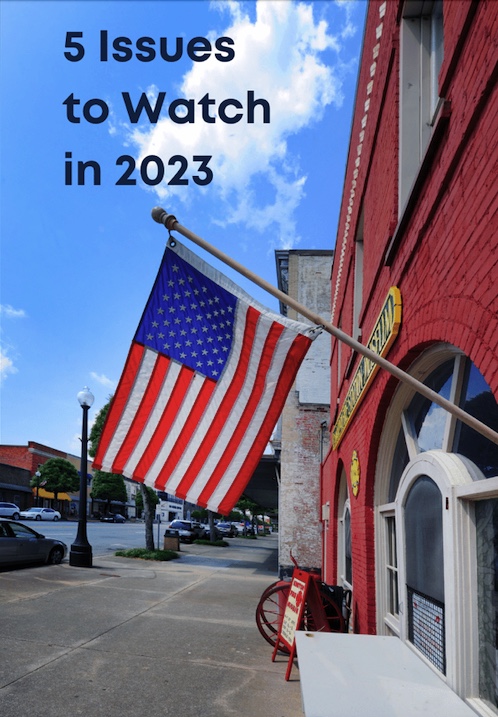5 Issues that Will Shape Local Government in 2023
As 2023 begins, UNC School of Government faculty are looking ahead to the issues that define recent public administration challenges and that will continue to shape the field in the future.
We recently talked with five of our faculty to find out which facets of the public sphere face both obstacles and opportunities in improving communities across North Carolina.
Teaching Assistant Professor
On how communities will use American Rescue Plan Act funds for pandemic recovery
“Many local governments are using the fiscal recovery funds to replace revenues they were expecting but that were reduced or eliminated because of the pandemic. There is broad latitude to use these funds on government services, including updating government facilities and equipment.
“Some towns have invested ARPA funds in downtown revitalization projects. Such projects have improved streetscapes by replacing signage, adding decorative lighting, and widening sidewalks. These revitalization projects will benefit communities because they drive foot traffic to businesses and restaurants in downtown areas and may result in an increase in the property values of nearby residences.
“Many counties are spending ARPA funds to complete necessary water and sewer infrastructure projects, such as repairing outdated sewer systems. Some communities have used funds to reduce homelessness by expanding the capacity of homeless shelters.”
Professor of Public Administration and Government; Director, Local Government Workplaces Initiative
On how the public sector can improve workforce recruitment and retention
“Local governments continue to struggle with recruitment and retention issues. But many will get creative in thinking of ways to boost the attractiveness of local government jobs and workplaces. While pay and benefits will be common strategies, local governments will also focus on workplace culture and job flexibility as ways to attract and retain good employees.”
Albert and Gladys Hall Coates Distinguished Term Associate Professor of Public Law and Government
On how local governments must tackle a changing housing and rental market
“Two local tax issues that are sure to remain in the headlines throughout 2023 are how best to tax and regulate short-term rentals such as VRBO and Airbnb properties and the impact of gentrification and rising property tax bills on lower income taxpayers. Both of these issues are tied to the increasing popularity of downtown neighborhoods that have been traditionally home to many minority and lower income families.
“Leaders of NC cities and towns will surely have to ask, how can we embrace growth but avoid squeezing out longtime residents?”
David M. Lawrence Distinguished Professor of Public Law and Government; Lead Faculty, Development Finance Initiative
On how public officials can work to increase the availability of affordable housing
“Local governments are actively pursuing policies and programs to increase the supply of affordable housing in their communities. This past year, several local governments approved bond referenda to provide substantial funding for affordable housing construction and lending.
“Here at the School, the Development Finance Initiative (DFI) has received numerous requests to assist counties and municipalities with affordable housing partnerships with the private sector, and those requests keep coming . DFI’s work with local governments ranges from using government-owned land for affordable housing, to partnering with private affordable housing developers to construct housing with tax credit financing, to affordable housing workshops for elected officials to help boards implement policies that reflect their unique priorities.
“At the state level, we expect the General Assembly to consider bills related to zoning, and that could have a substantial impact on housing development.”
Professor of Public Law and Government
On the issues likely to be adjudicated by the state courts this year
“Local governments should be aware of several issues percolating through the courts this year.
First, the state supreme court is considering Mole v. City of Durham, a case that may expand the ability of terminated employees to sue under the ‘fruits of one’s labor’ clause in the state constitution.
Second, the state supreme court recently issued an opinion in the ongoing Leandro litigation over school funding that has the potential to result in an influx of funds for schools in low wealth communities. However, the composition of the state supreme court is changing and some observers believe that the court may reconsider or limit its ruling.
Finally, the court system is considering multiple measures to address the backlog of cases that arose during the COVID pandemic.”
Published February 1, 2023


